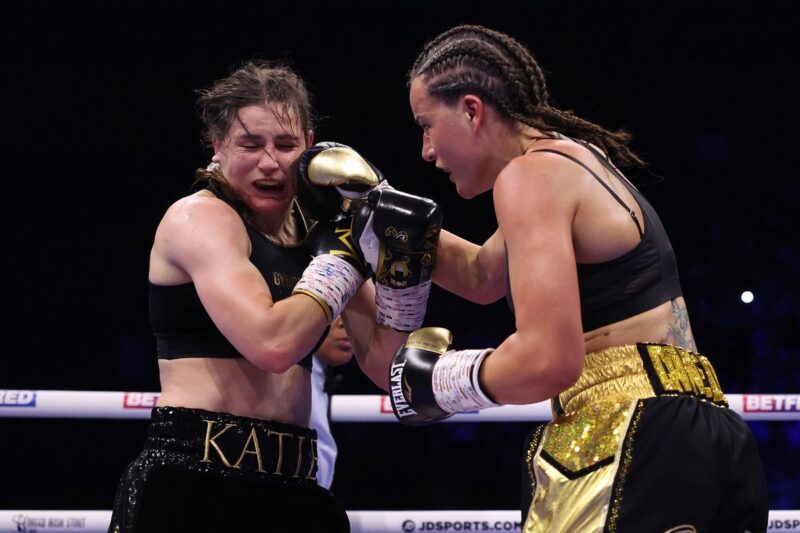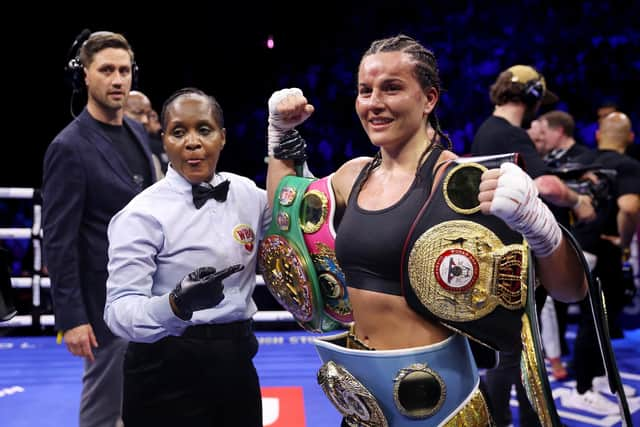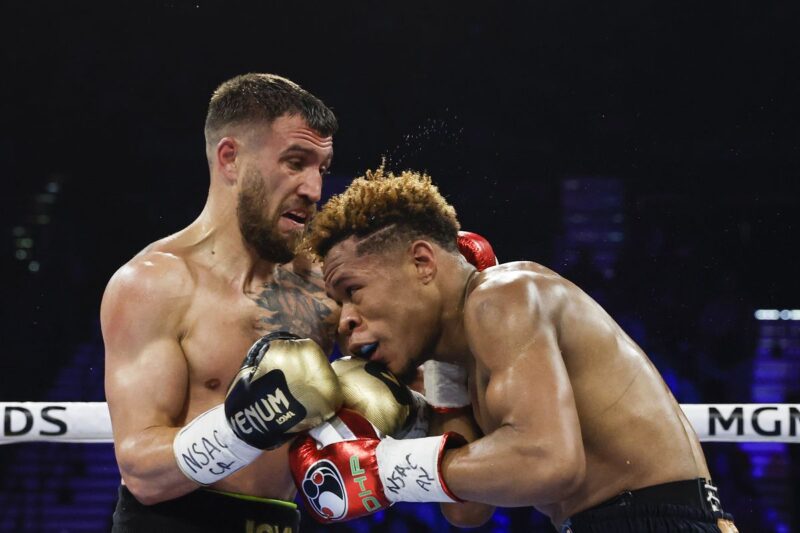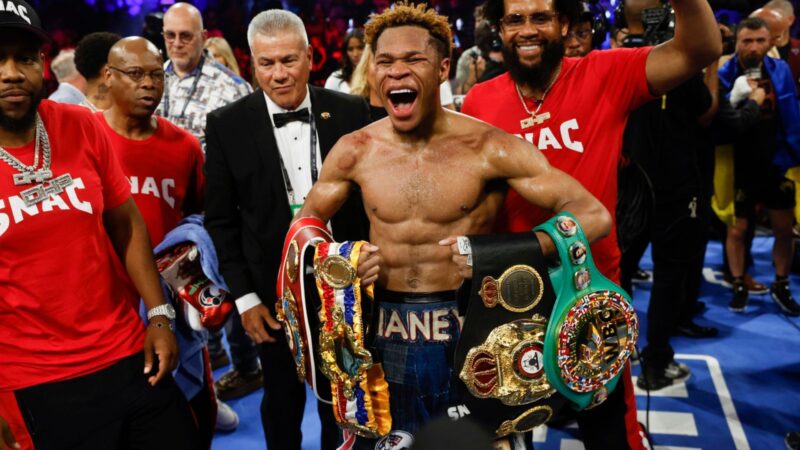Summed Up Report Of The Undisputed Weekend With One Ending In Controversy
Boxing has a way of giving its fans, and its participants, something to be upset about even while it’s giving them precisely what they want.
The sport can be funny that way. This weekend was an anomaly in terms of strength of schedule, even in the midst of a two-year period or so that has been chock-full of outstanding matchups between divisional aces. Saturday gave fight fans a card headlined by an undisputed title fight that ended nearly exactly when the card headlined by another undisputed title fight began. The fights themselves did not disappoint, in fact, they likely exceeded expectations. Yet, a weekend that gave us Katie Taylor-Chantelle Cameron and Devin Haney-Vasiliy Lomachenko is one that ended with something on the spectrum of a sigh, a groan, and an outright fit of rage.
Taylor-Cameron and Haney-Lomachenko were not just undisputed title fights, but bouts involving four of the very best fighters in the women’s and men’s ranks respectively, including two that were either presently or recently regarded as the best in the world period. In the case of the women’s clash, it doubled as an emotional homecoming for one of the sport’s true national heroes, Taylor, fighting in her home country for the first time as a professional. It was the kind of atmosphere and fandom that is unique to combat sports, providing the rabid yet gleeful tribalism usually reserved for team sports, except everyone in the building is rooting for one individual.
An entire city, and in this case, an entire country’s hopes riding on the shoulders of one woman.

Taylor, still the undisputed champion at lightweight as well, moved up in weight to face Cameron, the undisputed light welterweight queen, as opposed to postponing the date or picking a lesser opponent after her originally scheduled rematch with Amanda Serrano fell through. Taylor insisted upon a true challenge, rather than a high percentage matchup that would all but ensure victory in her return home. Taylor got everything she asked for and more, as Cameron proved to be big, strong, fast, and most of all, unflappable even in the hostile environment.
In the early rounds, Cameron’s success seemed to surprise the Dublin crowd, as it quieted to a near hush, save for the moments Taylor offered a combination. It’s a pattern fans had seen from Taylor in the past however. Against Serrano, Taylor willed her way back into the fight the way only special fighters seem to be able to—never panicking as long as there is a path to victory on the scorecards, no matter how narrow it may be. At the end of round five however, Ross Enamait told Taylor “it doesn’t have to be pretty, you just have to win,” suggesting that she could potshot rather than chomp down on her mouthpiece and wage a losing battle trading with Cameron.
Perhaps fueled by pride, perhaps plagued by calf injuries that hampered her for years, Taylor didn’t obey those orders at all. She did indeed try to slug it out with Cameron, and did win some rounds in doing so, but not quite enough of them.
Cameron later admitted that she had no concept of how many rounds she had won during the bout, and that during fights, even in environments as raucous and antagonistic towards her, she is simply in a flow state and not mentally scoring rounds. Still, when the first scorecard of 95-95 was read, Cameron admitted that she had a feeling of dread, expecting that something she’d “seen before with (stablemates of hers)” was about to happen. To her delight however, the next two cards read 96-94 in her favor, and she retained her titles. Some felt that the 95-95 scorecard was disastrous, but the furor was nowhere close to what fans would feel later on in the night.
However, the biggest moment of Cameron’s career, a win over a fighter she idolized, whom she said she was honored to share the ring with, was one of muted emotion. Cameron, who is even-keeled emotionally as previously described, couldn’t let it out and be too jubilant out of respect for and hesitance around the pro-Taylor crowd.

Similarly, those presenting the event couldn’t be as effusive in their praise for similar reasons. A breathtaking atmosphere that provided the stage for a legacy-defining victory was instead celebrated with solemn courtesy.
Nearly 4500 nautical miles away in Las Vegas, Haney and Lomachenko squared off in a classical big fight in Nevada atmosphere.

Though Haney and his family have made their home in Vegas for many years, “home” fighters don’t always get the Katie Taylor-esque treatment when they fight in Sin City. It’s still a city of tourists, transients, and people who have relocated somewhat recently. On this night, the MGM Grand was decidedly pro-Lomachenko, rooting for the aging master to school the young champion in a game of fistic chess, as the promotional theme implied.
What Haney-Lomachenko lacked in the pure ruggedness that Taylor-Cameron provided, it made up for with sheer tension. The chess analogy can be overplayed in boxing, but it is the closest analogy for fights like Haney-Lomachenko and why they are exciting without outright brutality. Watching actual high level chess is an exercise in waiting for one mistake, gasping when a genius finally makes an error.
Haney and Lomachenko brought distinctly different approaches to the ring. Haney was judicious in his punch selection, using his length to try to slow the tempo of the fight, and slow Lomachenko’s legs with constant body attacks. Lomachenko employed expert timing, both in terms of landing short, barely detectable shots in the midst of mesmerizing flurries, but also by oscillating between passive movement and all out blitzes.
Unlike Cameron, Lomachenko did have an ongoing scoring tally in his head, one that told him that simply playing it safe in the final round was the correct decision. If he had calculated differently, the discussion about the bout for the rest of time would potentially be entirely different.
Dave Moretti scored the bout 116-112, a score most observers not in the Haney camp have taken issue with. The other two cards, 115-113 for Haney, could potentially have been evened up if Lomachenko hadn’t cruised in the final round.
However, one can argue that even if it were a mistake in retrospect, after a dominant tenth round (one Moretti inexplicably scored for Haney) and another in the eleventh, Lomachenko was being cavalier but not foolish in thinking he’d done enough to win.

Discourse about Haney-Lomachenko thus far has ranged from cries out outright robbery and corruption to a reckoning of it being a good fight that was judged by at least one man in particular who misjudged perhaps the easiest round in the fight to score.
What ought to have been a celebratory night for boxing was instead tinder for discussion about its ills. Ultimately, no one, not even the winning fighters, walked away as happy as they should have.
By Corey Erdman

